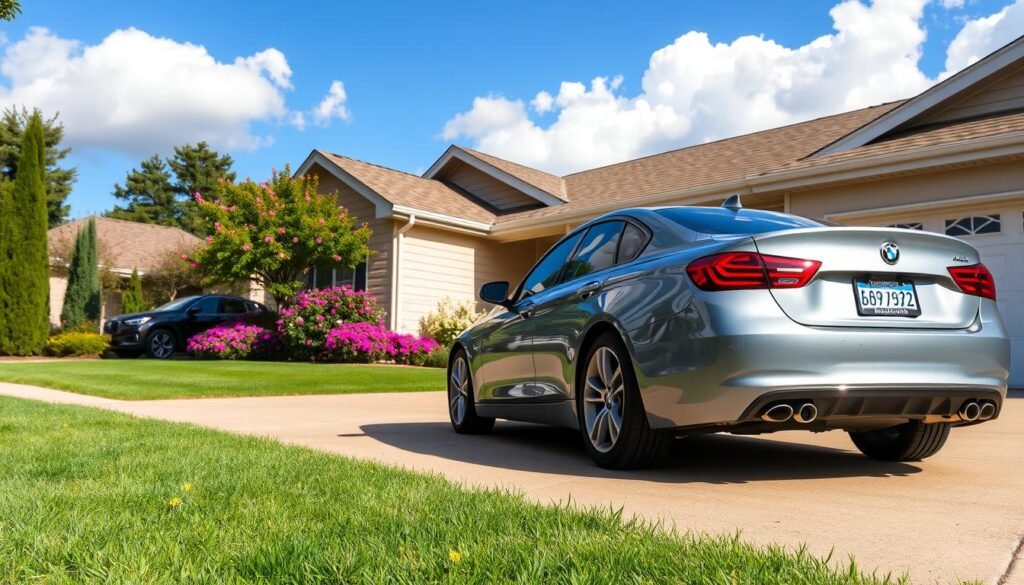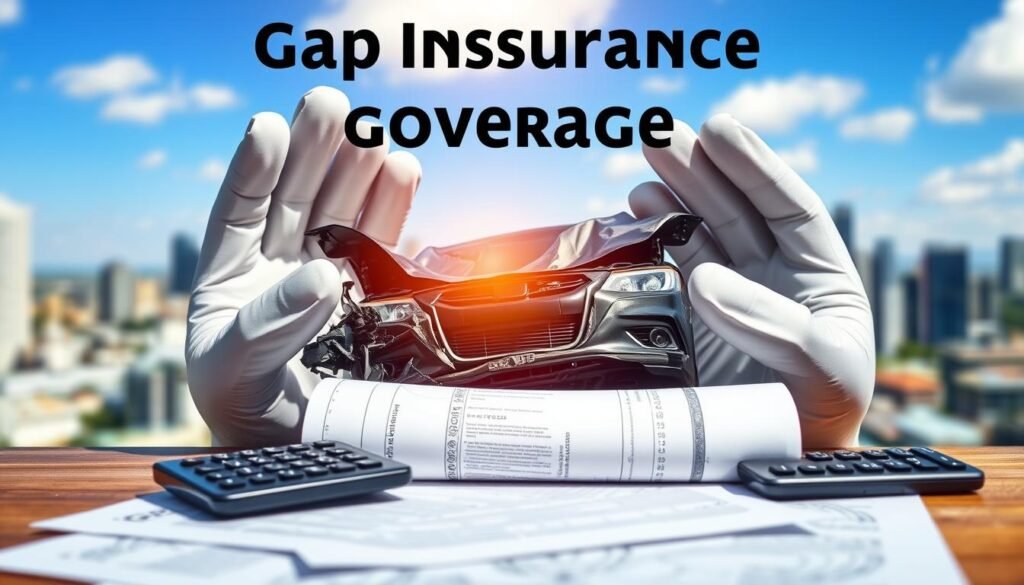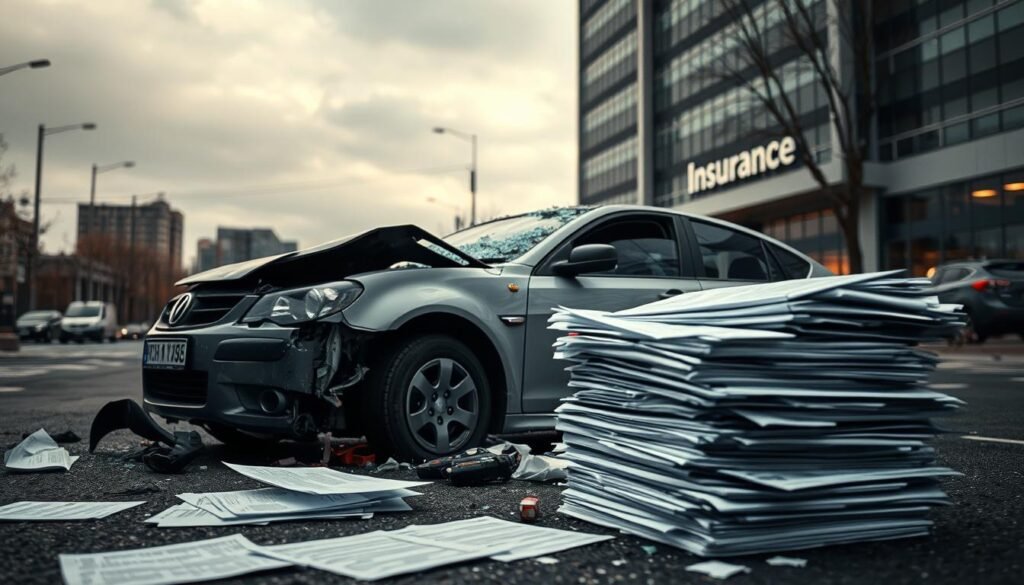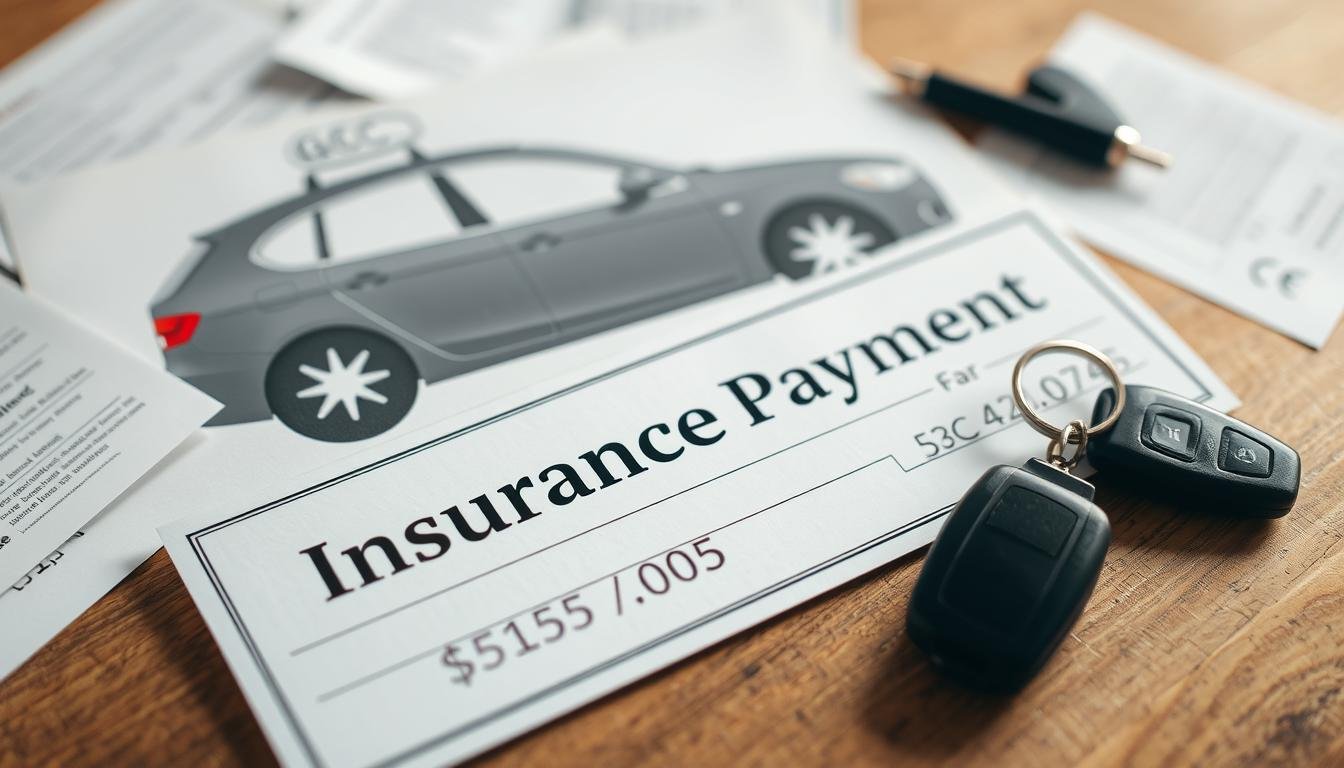Getting an insurance check for a totaled car can be confusing. But, it’s important to know who gets the money and what affects the payout. The insurance company usually pays the car’s actual cash value (ACV) minus any deductibles when it’s totaled. Things like who owns the car, loan or lease agreements, and gap insurance play a big part in who gets the money.
Key Takeaways
- The insurance company typically pays the actual cash value (ACV) of the totaled vehicle, minus any deductibles.
- Your car ownership status, loan or lease agreements, and gap insurance coverage are crucial factors in determining who receives the insurance check.
- If you own your car outright, you’ll typically receive the insurance payout directly.
- If you have an outstanding loan or lease, the lender or leasing company often receives the insurance check first to settle the debt.
- Gap insurance can help cover the difference between the ACV and the remaining loan/lease balance for a totaled vehicle.
Understanding Total Loss in Car Insurance
When your car gets badly damaged in an accident, your insurance might call it a total loss. This happens when fixing the car would cost more than its actual cash value. Knowing how they decide on a total loss is key to figuring out who gets the insurance money.
What Does It Mean When an Insurer Declares a Total Loss?
Insurance adjusters say a car is totaled if fixing it would cost more than 70% to 75% of its pre-accident value. This rule can change based on where you live. Some places use a different way to decide if a car is a total loss.
Factors That Influence Who Receives the Insurance Check
The amount you get from insurance for a totaled car depends on many things. These include the car’s make, model, year, mileage, and condition. Also, what the car market is like in your area matters.
If the car is under a loan or lease, the insurance pays the lender first. They take off any deductibles before giving you the rest of the money. If you don’t agree with the offer, you can make a counteroffer with proof like appraisals or repair bills. Gap insurance might help cover any extra costs if you still owe money on the car.
| State | Criteria for Totaling a Vehicle |
|---|---|
| Alaska | Repair costs exceed the vehicle’s value |
| California | Uneconomical to repair |
| Florida | Damage exceeds 80% of the vehicle’s value |
| New York | Damage exceeds 75% of the actual cash value |
| Ohio | Repair is “economically impractical” |
| Oregon | Damage exceeds 80% of the retail market value |
| Pennsylvania | Repair costs exceed the value of the repaired vehicle |
| Texas | Damage exceeds 100% of the actual cash value |
| Washington | Uneconomical to repair |
It’s important to know how insurance decides on a total loss and what affects the payout. This helps car owners deal with claims better and get a fair settlement if their car is totaled.
“When a car is totaled, the insurance company usually pays the lender first, deducting any applicable deductibles before issuing a settlement to the car owner.”
Scenario 1: You Own Your Car Outright
If you own your car without any loans or leases, you get the insurance payout for a totaled car. The insurance company figures out your car’s actual cash value (ACV) and takes off any deductibles. What’s left is yours to use, like buying a new car or for other things.
You might also choose to keep the totaled car and get some money for its salvage value. But, the insurance company will take off the salvage value from your total payout. It’s important to talk about the settlement fairly to get the most money for your claim.
Having your car paid off gives you more choices with the insurance money. You could buy a new car or look into other money-making ideas. Knowing how insurance claims work, including salvage value, helps you make the most of your payout.
| Scenario | Insurance Payout | Ownership |
|---|---|---|
| Owning a Car Outright | Insurance check sent directly to you | You have full ownership of the vehicle |

“When you own your car outright, the insurance payout for a totaled vehicle is typically sent directly to you, giving you the freedom to use the funds as you see fit.”
Scenario 2: You Have a Car Loan or Lease
If you have a car loan or lease, things get a bit tricky with insurance payouts. The insurance company will first pay off your lender or leasing company. They have a right to the vehicle. You get the rest of the money if the insurance payout is more than what you owe. But if the payout is less, you might have to pay the difference. Having gap insurance can help here.
The Role of Gap Insurance in Total Loss Payouts
Gap insurance helps cover the “gap” between the car’s value and what you still owe on the loan or lease. Without gap insurance, you might have to pay the loan balance even if your car is totaled. This is key for those with car loans or leases, making sure you’re not left with a big bill after a total loss.
| Scenario | Insurance Payout | Remaining Balance | Financial Responsibility |
|---|---|---|---|
| No Gap Insurance | $15,000 | $20,000 | $5,000 (paid by you) |
| With Gap Insurance | $15,000 | $20,000 | $0 (covered by gap insurance) |

“Gap insurance is a crucial safeguard for those with car loans or leases, as it can protect you from being stuck with a significant financial burden if your vehicle is totaled.”
Who gets the insurance check when a car is totaled
When a car is declared a total loss, the insurance company sends the check to the owner or the lienholder. This depends on who owns the car. It’s important to know who gets the money because it affects your money and what you do next.
If You Own Your Car Outright
If you own your car without any loans or leases, the insurance company will send the check to you. You can use the totaled car insurance payout to get a new car or pay off any debts.
If You Have a Car Loan or Lease
Things change if you have a lender or leasing company that has money invested in your car. The insurance company will first pay off your loan or lease. This makes sure the lender or leasing company claims are covered first.
If the totaled car insurance payout is more than what you owe, you might get the extra money. But if the payout is less, you might have to pay the difference to the lender or leasing company.
Negotiating the Settlement
If you think the insurance company valued your car too low, you can try to negotiate the settlement. You can show proof of your car’s real value, like recent sales of similar cars. Getting legal representation can also help you get a fair deal.
Knowing who gets the insurance check when a car is totaled is key to making smart choices and protecting your money. Being clear about your vehicle ownership status and the role of your lender or leasing company helps you handle the situation better.

Conclusion
Dealing with a totaled vehicle can feel overwhelming. But, knowing about total loss car insurance helps protect your money. Make sure to check your policy and keep track of talks with your insurer. This way, you can make sure you get paid what your car is really worth.
If you need help, think about talking to a car accident attorney in your area. They can guide you through the claims process. This ensures your rights are looked after and you get the pay you deserve.
Handling a totaled car is tough, but being informed and active helps. With the right support and knowledge of the insurance claim process, you can get through this. You’ll come out stronger and ready to move on.
FAQ
What does it mean when a car is declared a total loss?
When a car is declared a total loss, it means fixing it would cost too much. This is usually when repairs cost more than 60-80% of the car’s value. Adjusters look at the car’s make, model, year, mileage, and condition to decide.
Who gets the insurance check when a car is totaled?
The insurance check goes to the car’s owner or the lienholder. If you own the car, you get the check. If you have a loan or lease, the lender gets paid first. Then, you get the rest if there’s any money left over.
What is the role of gap insurance in a total loss payout?
Gap insurance helps cover the difference between the car’s value and what you owe. It makes sure you’re not stuck with debt if the insurance doesn’t pay enough.
Can I negotiate the insurance settlement for a totaled car?
Yes, you can try to negotiate if you think the insurance offer is too low. You might want to get a lawyer to help make sure you get a fair deal.
What happens if the insurance payout is less than what I owe on my car loan or lease?
If the insurance doesn’t pay enough to cover what you owe, you’ll have to pay the rest. But, with gap insurance, it covers the difference. This way, you won’t be stuck with extra debt.
